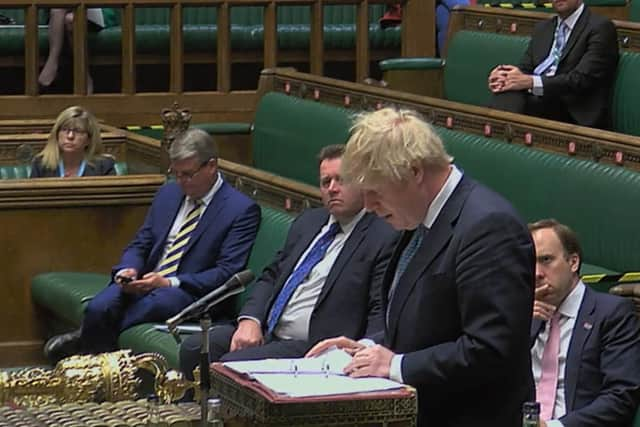Boris Johnson denies Government was too slow on protecting care homes from coronavirus crisis
This article contains affiliate links. We may earn a small commission on items purchased through this article, but that does not affect our editorial judgement.
Labour leader Sir Keir presented the Prime Minister with advice issued by Public Health England on February 25, and valid up until March 12, where it was advised it was “very unlikely that anyone receiving care in a care home or in the community will become infected” as the document pointed out “there is no current transmission of Covid-19 in the community”.
Speaking at Prime Minister's Questions Sir Keir said: “In his speech on Sunday the Prime Minister said we need to rapidly reverse the awful epidemic in our care homes, but earlier this year, and until 12 March, the Government’s own official advice was, and I’m quoting from it, ‘it remains very unlikely that people receiving care in a care home will become infected’.
Advertisement
Hide AdAdvertisement
Hide Ad“Yesterday’s ONS figures show that at least 40 per cent of all deaths from Covid-19 were in care homes. Does the Prime Minister accept that the Government was too slow to protect people in care homes?”


Mr Johnson replied: “No Mr Speaker it wasn’t true that the advice said that, and actually we brought the lockdown in care homes ahead of the general lockdown.”
He added: “And a huge exercise in testing is going on, a further £600 million I can announce today for infection control in care homes, and yes it is absolutely true that the number of casualties has been too high but I can tell the House, as I told (Sir Keir) last week and indeed this week, the number of outbreaks is down and the number of fatalities in care homes is now well down.”
Some 8,312 people are now thought to have died in care homes in England and Wales, compared to 22,873 in hospitals and 35,044 overall.
Advertisement
Hide AdAdvertisement
Hide AdAnalysis taking into account deaths in Scotland and Northern Ireland too, the death toll is now thought to sit at over 40,000.
It comes as Mr Johnson announced a further £600m for infection control in care homes.
Sir Keir also asked for the Government’s view on the 10,000 “unexplained” excess deaths in care homes in April.
Advertisement
Hide AdAdvertisement
Hide AdHe said: “The ONS records the average number of deaths in care homes each month. The last five years the average for April has been just over 8,000.
“This year the number of deaths in care homes for April was a staggering 26,000 – that’s three times the average – 18,000 additional deaths this April.
“Using the Government’s figures only 8,000 are recorded as Covid deaths, that leaves 10,000 additional and unexplained care home deaths this April.
“Now I know the Government must have looked into this so can the Prime Minister give us the Government’s views on these unexplained deaths?”
Advertisement
Hide AdAdvertisement
Hide AdMr Johnson said there “is much more to do but we are making progress” on reducing the pandemic in care homes.
He said: “Coronavirus is an appalling disease which afflicts some groups far more than others, I think the whole country understands.
“And in particular the elderly, and he’s right to draw attention, as I said, to the tragedy that has been taking place in care homes.
“The Office of National Statistics is responsible for producing the data that they have, the Government had also produced data which not only shows that there has been, as I said, a terrible epidemic in care homes but since the care homes action plan began we are seeing an appreciable and substantial reduction, not just in the number of outbreaks but also in the number of deaths.”
Advertisement
Hide AdAdvertisement
Hide AdAnd when asked to respond to a cardiologist quoted in the Daily Telegraph who said elderly people were being sent back to care homes with the virus, Mr Johnson said: “I have the upmost respect for all our medical professionals who are doing an extraordinary job in very difficult circumstances but what I can tell the House is that actually the number of discharges from hospitals into care homes went down in March and April.
“And we had a system of testing people going into care homes and that testing is now being ramped up.”
The system he referenced was launched on April 15.
----------------
Editor’s note: First and foremost - and rarely have I written down these words with more sincerity - I hope this finds you well.
Almost certainly you are here because you value the quality and the integrity of the journalism produced by The Yorkshire Post’s journalists - almost all of which live alongside you in Yorkshire, spending the wages they earn with Yorkshire businesses - who last year took this title to the industry watchdog’s Most Trusted Newspaper in Britain accolade.
Advertisement
Hide AdAdvertisement
Hide AdAnd that is why I must make an urgent request of you: as advertising revenue declines, your support becomes evermore crucial to the maintenance of the journalistic standards expected of The Yorkshire Post. If you can, safely, please buy a paper or take up a subscription. We want to continue to make you proud of Yorkshire’s National Newspaper but we are going to need your help.
Postal subscription copies can be ordered by calling 0330 4030066 or by emailing [email protected]. Vouchers, to be exchanged at retail sales outlets - our newsagents need you, too - can be subscribed to by contacting subscriptions on 0330 1235950 or by visiting www.localsubsplus.co.uk where you should select The Yorkshire Post from the list of titles available.
If you want to help right now, download our tablet app from the App / Play Stores. Every contribution you make helps to provide this county with the best regional journalism in the country.
Sincerely. Thank you.
James Mitchinson
Editor